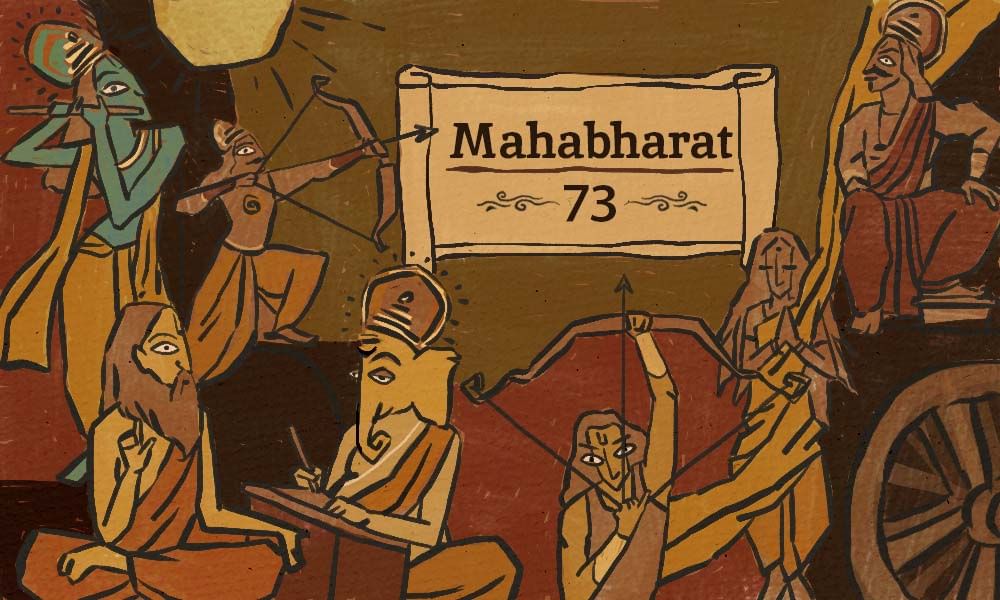Mahabharat Episode 73: The King and the Nagas: A Story of Retribution and Revenge
Krishna and the Pandavas have passed on and the new generation of Kshatriyas inhabits Hastinapur with Arjuna’s grandson as their king. But the shadow of the past still looms over the words and deeds of today as Arjuna’s feud with the Nagas continues through his progeny. Will the violence go on forever? Who will break the vicious cycle of revenge? Will there ever be peace?

No Escape from the Curse
Sadhguru: The Pandavas and their generation were gone. Parikshit was coronated as the king. Parikshit literally means, “a tested one,” or someone who has faced the pariksha** before being born. He was a stillborn child. Krishna literally gave his own life to him, and he grew up to rule as the king.One day, he was out hunting and became very thirsty. He came to a small clearing. There was a hut where a Yogi was sitting and meditating. Parikshit said to the Yogi, “I am thirsty – give me water.” The Yogi did not respond. He was in another state. The king got irritated. When a royal request is made, you are supposed to respond. He looked around and saw a dead serpent. He picked it up with an arrowhead and put it around the Yogi’s neck.
A disciple of the Yogi came by, and when he saw this sacrilege, he got so furious that he cursed the king, “For what you have done to my Guru today, you will die of a snakebite within seven days.” Parikshit was terrified. He ran back to Hastinapur and built a small place upon a column where he could live, so that the snakes could not climb up.
Subscribe
In the town of Hastinapur, people started gossiping, “What has happened to our king? His father was Abhimanyu, a great warrior. His grandfather was Arjuna, the greatest Kshatriya that ever lived. Why is our king sitting on a post in terror? What kind of a man is he?” But he was terrified of getting killed by a snake, so he sat on a post for seven days. On the seventh day, his trusted guards brought him fruit. He bit into the fruit, and out of it came a little snake that grew in size and bit him in the neck. Before the guards could come and save him, he died of the snakebite.
A Vicious Cycle of Revenge
When Parikshit’s son, Janamejaya, saw his father being killed by this Naga**, he got so furious that he called all his priests and said, “Let us conduct a Sarpa Satra yagna**. In this yagna, mantras are chanted, and all the snakes in the vicinity come and fall in the sacrificial fire and die. He wanted to conduct a snake sacrifice in revenge for his father’s death. The priests were also happy because they had their own grouse against the Nagas. So they started the yagna and the serpents slowly began to come closer and fall into the fire. Hundreds of them killed themselves.
Then one of the Nagas called Astika came by and told Janamejaya, “Stop this cruel yagna. Your father was being punished for his arrogance and imprudence. He did this to a Yogi, so his disciple cursed him. Your great-grandfather Arjuna burned the Khandava Vana** to build his city. He burned every Naga in the place and shot down those who tried to escape with his arrows. The only one who escaped was Takshaka. Takshaka has been waiting for all these years to take revenge on the Kuru clan, and he fulfilled the cycle.
“If you burn these Nagas, so many other Nagas will be orphaned, and they will take vows of revenge once again. It will create an endless cycle of revenge and avenge. Let’s put this to an end. I am telling you this because my father is a Manava** and my mother is a Naga. So, I am a part of you and a part of the Nagas. Please believe me, I am speaking dharma.
Janamejaya asked, “What is this story that you were telling me about my great-grandfather? How do you know about this?” Astika said, “Let us call Vaishampayana. He is the best one to tell you the story.” They called the sage Vaishampayana who was the disciple of Vyasa, and the first one to hear the story of Mahabharat from Vyasa**. Vaishampayana told the Mahabharat story to Janamejaya, and this is said to be the story that we hear today. They say the original written version of the Mahabharat had disappeared because it was so fabulous that the gods loved it and stole it.
The Final Lesson
The yagna was abandoned, and Astika felt very proud. “I stopped the yagna and saved the Nagas from annihilation.” Then the dog Sarama came by and said, “It is not Astika who stopped the yagna. When the yagna was started, Janamejaya and his sons threw stones at my children, unnecessarily accusing them of defiling the sacrificial offerings. Because of that, I cursed Janamejaya that this Naga sacrifice yagna should not succeed. That is the reason why it got abandoned.”
That is a final lesson for you: do not think too much of yourself. We have our bit to play, and it is just a bit. There are too many other aspects of life that are influencing who and what we are right now.
**pariksha : Sanskrit for test.
**Naga : Snake or cobra.
**Sarpa Satra yagna : A certain kind of ritual.
**Khandava Vana : A forest inhabited by the Nagas.
**Manava : Human.
**Vyasa : Sage Vyasa was the first to write down the story of Mahabharat.
To be continued...


